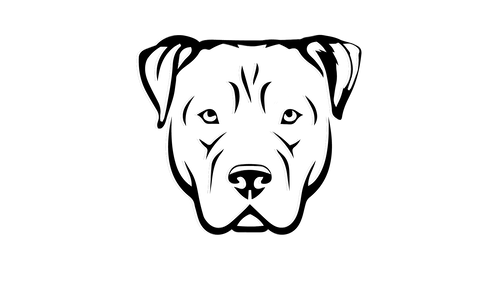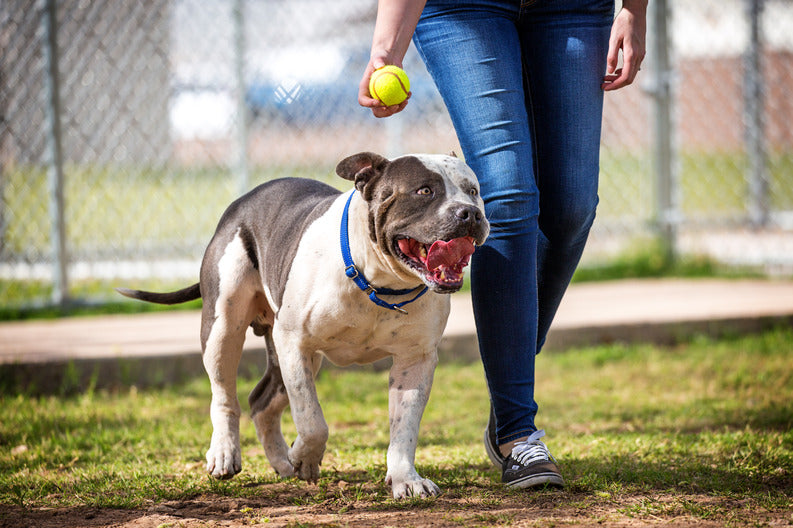Pitbulls are one of people's favorite breeds. There are about 18 million Pitbulls worldwide and over 4.5 million pups gracing American homes. That is almost 6% of all dogs. People love these dogs because of their loyalty, quirky personalities, endless energy, and impressive athleticism.
But with all that tail-wagging fun comes a question dog parents ask: how long do Pitbulls live? The truth is, there's no one-size-fits-all answer to a Pitbull's lifespan. Several factors come into play, and this guide explores things that affect Pitbull's lifespan and gives tips on how to extend their lifespan.
Understanding Pitbull Lifespan: How Long Do Pitbulls Live?
|
Breed |
Life Expectancy |
|
American Pit Bull Terrier |
8 to 15 years |
|
American Staffordshire Terrier |
12 to 16 years |
|
Staffordshire Bull Terrier |
12 to 14 years |
|
American Bully |
8 to 15 years |
The surprising truth is that Pitbull isn't a single breed. It's more like a nickname for a group of breeds referred to as bully breeds. These are stocky breeds packed with lean muscle, evident in their broad chests and powerful legs.
Pitbulls are healthy dogs with their lifespan ranging from 8 to 15 years. So, expect to enjoy a solid decade of playtime, cuddles, and adventures with your furry friend. Note that size plays a role in a dog's lifespan.
Like other dog breeds, bigger Pitbulls tend to have slightly shorter lifespans than their smaller counterparts. This is because larger dogs age faster than smaller ones. So, if you have a compact Pitbull, you might have a companion on your hands for longer.
However, the exact life expectancy depends on the specific dog breed. Here is a breakdown of Pitbull breed variations and their average lifespans.
Just like how the advertised fuel consumption varies from real-life driving due to terrain and load, the same applies to a dog's lifespan. Above are average life expectancies, but the actual lifespan depends on health, diet, genetic and lifestyle conditions as follows.
Genetics
Every dog inherits a unique genetic blueprint from its ancestors. This DNA code acts like an instruction manual, dictating everything from fur color to physical traits and susceptibility to certain health problems. The common hereditary health conditions in Pitbulls include blindness, bladder stones, balance problems and nerve disease.
According to a study by Wisdom Health and Genoscoper Laboratories, roughly five out of every 100 purebred dogs were at risk of developing at least one of the hereditary diseases, while 28 out of 100 were carriers. Remember, genetic diseases are not like occasional illnesses that come and go. These are chronic conditions.
Obviously, dogs with chronic health issues have shorter lifespans, and their quality of life isn't great. The best thing to do is to avoid adopting a dog with genetic issues from the onset. The good news is that there are DNA tests that look for specific markers in your dog's genes that are linked to certain diseases.
It's like a health check-up but done with a DNA swab. That's why you need to adopt your Pitbull from reputable breeders that do DNA tests and avoid breeding dogs with hereditary issues in their facilities. You can know whether the breeder is reputable by checking customer reviews.
Lifestyle
Have you ever seen a chunky Pitbull and thought, awww, adorable!? The reality is that those extra pounds put your pup at risk of health problems such as cancer, diabetes, heart disease, sore joints, and trouble breathing. Of course, this means reduced lifespan.
According to Dr. Aliyah Diamond, a weight management expert at Cornell University College of Veterinary Medicine, a healthy Pitbull weighs 30 to 60 pounds. That doesn't mean you stop feeding your furry friend when he exceeds this weight. The solution is exercise.
Pitbulls are energetic, and you can take them for around 1 to 2 hours of exercise every day. That doesn't have to be one long, intense session, though. Break it up into walks and playtime. The exercise helps burn calories, improve digestion, regulate blood pressure, and maintain muscle mass.
Diet
Dog owners love to spoil their furry friends. But sometimes, those extra treats and cuddles on the couch lead to a bit of extra weight, or maybe you adopted a Pitbull that's a little more round than the recommended size and weight.
Even with exercises, the pup needs the right diet and portion to maintain a healthy weight and prolong its life. Protein is the building block of muscles, and since Pitbulls are naturally muscular, a high-protein diet rich in amino acids helps them stay strong and energized. So, make sure the food contains things like:
- Eggs
- Fish such as tuna, trout and salmon
- Lamb
- Beef, especially the lean cuts
- Turkey
- Chicken, especially skinless
While protein is key for Pitbulls, that doesn't mean their diet should be all meat all the time. Add some plant-based ingredients to create a well-rounded and nutritious food bowl. Consider things like:
- Spinach
- Carrots
- Mushrooms
- Sweet potato
- Broccoli
Health
Pitbulls are playful and athletic, but like any other breed, they are predisposed to certain health conditions. The solution lies in early detection and treatment. Here are the common health conditions to look out for.
Dental Disease
Do you know dental disease is the ultimate party crasher for pups? It affects a whopping 80% of dogs by age two, and unfortunately, Pitbulls are more susceptible than other breeds. Tartar builds up on their teeth, leading to inflamed gums and infected roots.
If left unchecked, this condition causes tooth loss and puts the kidneys, liver, heart, and joints at risk. The worst part is that dental disease shortens your Pitbull's lifespan by 1 to 3 years. So, brush the dog's teeth at least twice a week to prevent dental issues.
Gastric Torsion
Gastric torsion is a scary condition affecting any dog breed, but Pitbulls seem more at risk. Their stomach fills with gas, fluid, or food and then takes a nasty twist. This condition is life-threatening if not treated immediately. Bloating mostly strikes middle-aged and older dogs, but it can happen anytime.
That's why prevention is key. Slow your pup's eating speed with puzzle feeders or by dividing meals into smaller portions. Wait at least an hour after eating before playtime and walks. The common signs of bloat are restlessness, hard belly, and unproductive vomiting.
Cerebellar Ataxia
This condition affects the cerebellum, the part of the brain that controls balance and coordination. It's like the body's internal GPS gets scrambled. Affected pups develop wobbly gaits and struggle to judge distances. The dog walks like a wobbly toddler just learning to walk.
The condition is genetic and affects Pitbulls early in life, usually between 6 and 16 weeks old. The exact cause of this condition is a mystery, and there's no cure. However, the good news is that cerebellar ataxia doesn't worsen over time, and the condition isn't painful.
Patellar Luxation
Have you ever seen your Pitbull hopping like they're skipping a beat? This could be a sign of patellar luxation. It's the kneecap slipping out of its groove. Patellar luxation can range from mild to severe.
The early sign of the problem is the pup limping for a few steps after their kneecap pops out, then pops it back in and starts walking normally. So, if you notice your Pitbull limping, hopping, or favoring a leg, consult your veterinarian for immediate treatment. Note that severe cases might need surgery.
Hip Dysplasia
Hip dysplasia is a hereditary health condition that results from uneven bone development around the hip joint, leading to painful arthritis. The common signs are the pup limping in the hind legs due to hip pain. The dog might also have trouble getting up.
Although it's a hereditary condition, overweight Pitbulls are prone to hip dysplasia earlier in life and experience more pain. Remember, the condition doesn't allow the dog to go for rigorous exercises like hikes and jogs. The only way to lose weight is through a proper diet. So, make sure you feed your furry friend with the right food position to avoid obesity.
Tips to Extend the Life Expectancy of Pit Bulls

There are other things that can just cut short the life of your furry friend. For example, over 1.2 dogs across the US have close calls with cars every year. But these are things that dog owners can prevent. So, here are simple tips that can help you extend the lifespan of your Pitbull.
- Pitbull puppies, like toddlers, are curious explorers. Keep an eye on them to avoid accidents.
- Close doors, pick up anything the dog shouldn't chew on, and block off rooms if needed.
- Make sure your fence is strong so the dog doesn't escape during playtime.
- Brush the dog's coat once a week to keep it healthy and hygienic.
- Stick to a consistent, high-quality diet appropriate for their age. Avoid table scraps!
- Brush the dog's teeth at least twice a week and clean the ears at least once a week to prevent infections.
- Consider visiting the vet regularly for a checkup. The vet will be able to pick up any underlying health problems and provide early treatment.
Final Thoughts
The secret to a long and happy life with your Pitbull starts from adopting a puppy without hereditary health issues to caring for the pup the right way. When adopting the dog, ask about the lifespan of their parents and grandparents. Chances are, your pup will inherit similar longevity. Feed your dog with the right portions of a balanced diet and take it for daily exercises.

